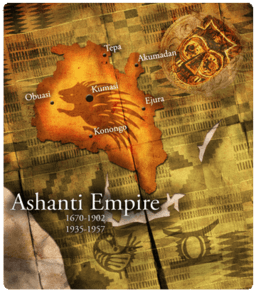The history of African people who developed and achieved highly includes the Asantes. Their kingdom was established in 1701 in the area of modern-day Ghana after the venerable Osei Tutu defeated rivals and united smaller ethnic groups into one people. Asante prosperity was firmly rooted in economic security afforded by the ready supply and trading of gold and other products. Traders, politicians, soldiers, farmers, and other knowledgable and skilled citizens populated the kingdom. Guided by its own constitution, the Asante kingdom grew into a highly functioning state, the most powerful in the coastal region for over 200 years.
In addition to its powerful military and well organized governance, collaboration with the powerful traditional priest Okomfo Anokye sealed the Asante victory. The Asantehene Osei Tutu alliance with Okomfo Anokye represented an indivisible relationship between political and spiritual allegiance that substantiated political leadership, compelled moral behavior, and encouraged ethical governance. When Okomfo Anokye facilitated the miraculous delivery of the sacred golden stool—representing the soul of the Asante people—the ordination of divine Asante leadership, solidarity, and protection were complete. This action acknowledged a greater power and its influence on all aspects of life. The spiritual orientation animated a common African knowing central to the growth and development of the Asante and other early African nations.
To learn more about the Asante kingdom and how its two extraordinary founders—Asantehene Osei Tutu and Okomfo Anokye—worked together to build and consolidate the kingdom, click here.

